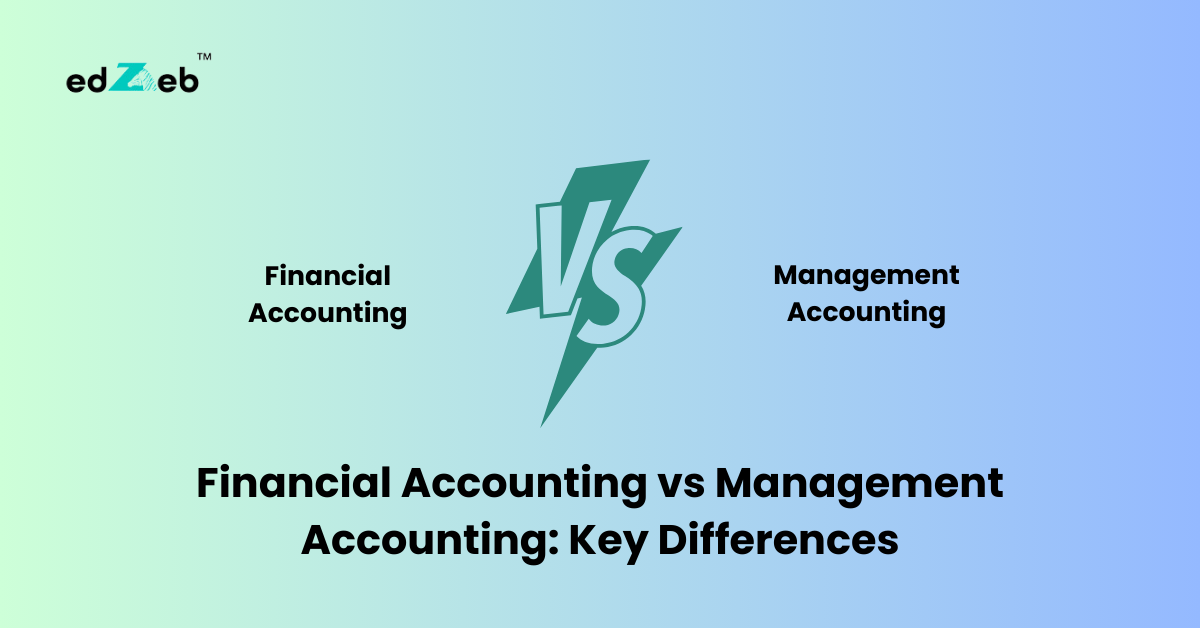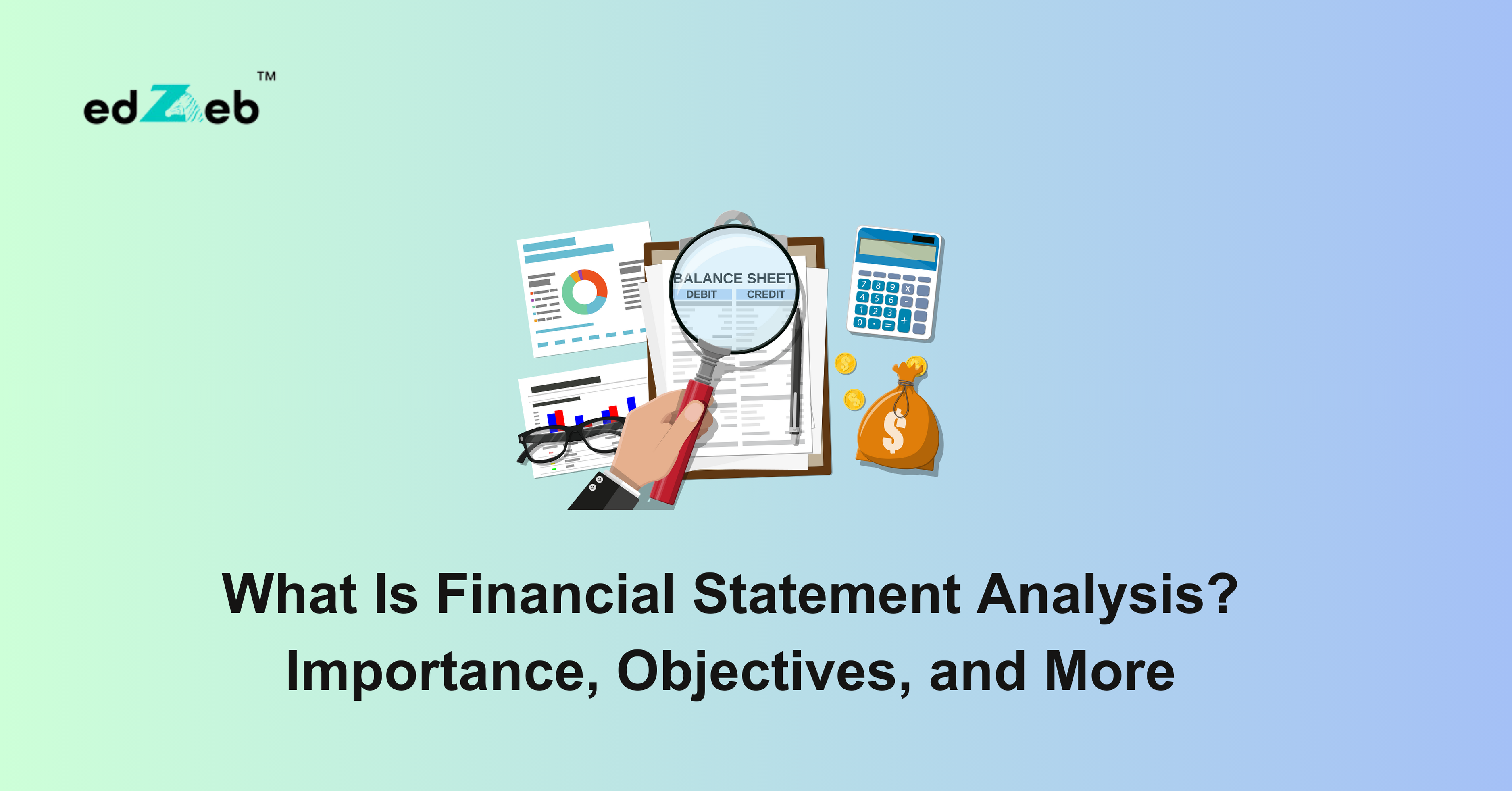
Accounting is the language of Business! It connects the number meaningfully to arrive at a decision; be it tracking financial health or strategizing the future growth of a business, accounting is the basis of all economic activities. And knowing the various types of accounting can help apply the right financial strategies for each business goal.
The blog further elaborates on the difference between financial accounting and management accounting.
Table of Contents:
Financial Accounting vs Management Accounting: An Overview
To master these both, students often turn to professional accounting courses in India that offer deep insights into each stream and their practical applications in today’s business world.
Financial Accounting and Management Accounting are two entirely different disciplines within a general domain of accounting. They cater to entirely different branches so let us get to know them one by one.
What is Financial Accounting?
Financial accounting has its main focus on recording, summarizing, and reporting financial transactions. Assessing the financial health of the firm is essential for external stakeholders such as investors, regulators, and creditors.
Financial Accounting denotes the following characteristics:
- It develops balance sheets, income statements, and cash flows that conform to the IFRS or GAAP framework.
Know our detailed Comparison between IFRS vs GAAP.
- Financial accounting traces historical financial information.
- It has external reporting and compliance objectives.
What is Management Accounting?
Management accounting system collects, analyzes, and understands financial as well as statistical information so as to result in better and effective decisions regarding the business. It helps managers plan, strategize, and control the operations to ensure the performance of organizational goals.
Features of Management Accounting:
- Budgeting, forecasting, and variance analysis tools;
- future projections and internal operations;
- Custom reports as per the individual management needs.
What are the Differences Between Financial Accounting and Management Accounting
Certainly, a significant difference exists between both; while financial accounting shows accountability and transparency to the stakeholders in terms of conformity and trust, management accounting measures and employs more internal efficiencies to reach strategic goals. Here is a table having a brief focus on Financial Accounting vs Management Accounting:
| Criteria | Financial Accounting | Management Accounting |
Objective | To provide a true and fair view of the company’s financial health for external stakeholders. | To support internal decision-making and strategic planning. |
Primary Users | investors, creditors, regulators, and tax authorities. | Internal managers, executives, and department heads. |
Focus | Historical performance and transactions. | Future projections, trends, and operational insights. |
Nature of Reports | Formal, structured, and standardized | Informal, flexible, and tailored |
Compliance | GAAP or IFRS | organization-specific |
Frequency | periodically (quarterly, annually) | Prepared weekly, monthly, or ad-hoc). |
Time Orientation | Focuses on past performance and transactions. | Focuses on future planning and strategy. |
Content | Quantitative data based on financial transactions. | Both quantitative and qualitative data, including non-financial metrics. |
Level of Detail | Summarized data for external presentation. | Detailed and granular data for internal use. |
Examples | Income statement, balance sheet, cash flow statement. | Budgets, cost analysis, variance analysis, and KPIs. |
You shall find it interesting to read further to know more about the difference between financial accounting and management accounting in detail.
Purpose
Mainly financial statements are external in having decisions for investment or loans or for transparency with a regulatory body. However, management accounting is concerned with the optimization of the various internal business processes going on within the organization.
Users
It creates financial statements that clearly show the financial status of the organization to its investors, creditors, regulators, and other tax authorities. It is used by management, heads of departments, and executives for the purposes of planning budgets, forecasting revenues, and ensuring operational efficiency.
Focus
While financial accounting focuses only on past financial transactions, management accounting is future-oriented and emphasizes forecasting, budgeting, and the analysis of future trends. It uses both historical data and predictive models for proactive business decision-making.
Standards
The former regime is very strict in reporting along the lines of GAAP or IFRS, which provides consistency, reliability, and comparability for organizations. Understanding the Differences Between IFRS and GAAP is crucial as these standards offer distinct guidelines for financial reporting. Unlike these external frameworks, management accounting does not follow any strict guidelines or regulatory frameworks. Management accounting reports are flexible and tailored to meet the specific needs of the organization, focusing on relevance rather than standardization.
Reports
On one hand, financial accounting statements like the balance sheet, income statement, and cash flow statements are very structured and formal. These documents have a particular format to conform to regulations as well as the needs of stakeholders. On the other hand, management accounting provides dynamic and tailored reports that mostly define the requirements of the managing function. The variance analysis report, for example, will be very different in format from budgets, performance dashboards, and quite possibly other purpose-specific reports.
Does Managerial Accounting Follow GAAP?
Additionally, there were no standards in managerial accounting, including GAAP, since it’s prepared for internal management and does not require validation or standardization from the outside world. As to flexible methods and reporting formats, these are more dependent on what is most important for analysis by the organization. On the other hand, GAAP has rigid standards, which limit the customization of managerial views.
In addition, management accounting includes both financial and non-financial data alongside predictions, budgets, and forecasts, which GAAP clearly does not cater to.
Lastly, GAAP is mandatory for publicly listed companies and not for private companies that prepare accounts for external users only. And as you know, managerial accounting is entirely internal, hence free from any form of regulatory compliance.
The Bottom Line
Completely different serving distinct objectives from each other are financial accounting and management accounting. They are the two pillars of modern business operations while relishing the unique supplement that can be derived from their combination which has been accentuated with financial integrity and strategic planning that is sustainable towards growth. Therefore, whether one speaks of external compliance or internal optimization, it is better to understand what differences exist in order to achieve excellence in the increasingly dynamic field.
FAQ’s
What is the difference between finance and management?
These two disciplines can be clearly differentiated from one another on the basis of focus, purpose, and scope. First, finance has been concerned with planning, organizing and controlling its monetary resources. Management includes decision-making, strategy, organizational behavior, and human resources.
Can a Management Accountant become a financial accountant?
Oh, yes definitely, a management accountant can become a financial accountant.
Which is better: an MBA in finance or accounting?
An MBA leads to a variety of career opportunities, but they differ in the scope of the curriculum and the type of skills developed in finance or accounting which differ in job roles.
How do I become a financial management accountant?
For that you can enroll yourself in the best US CMA coaching center, one among them is edZeb in Delhi, well-known for its result-oriented coaching and for making students job-ready.









